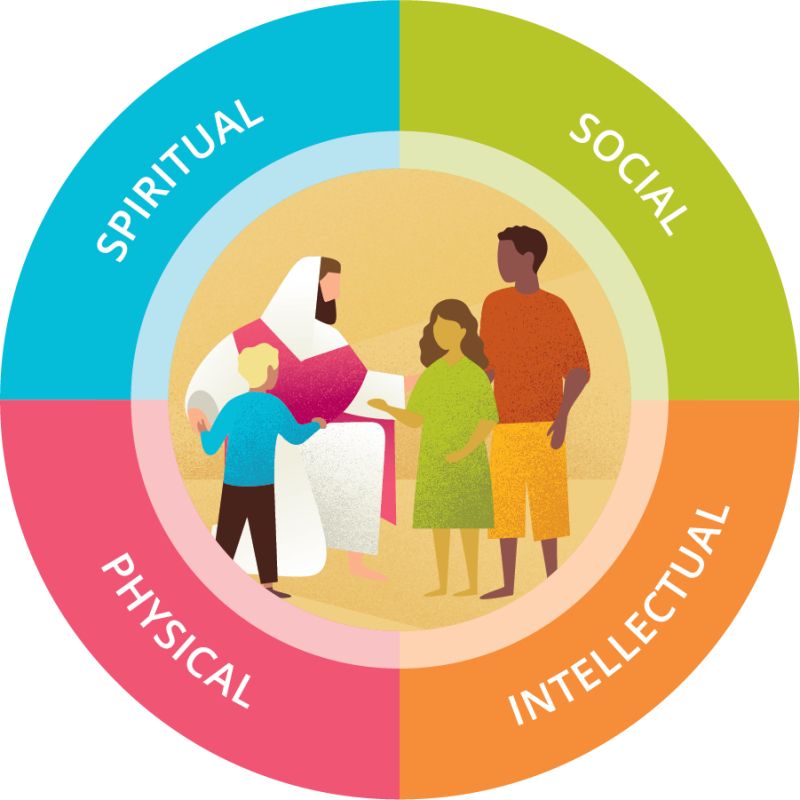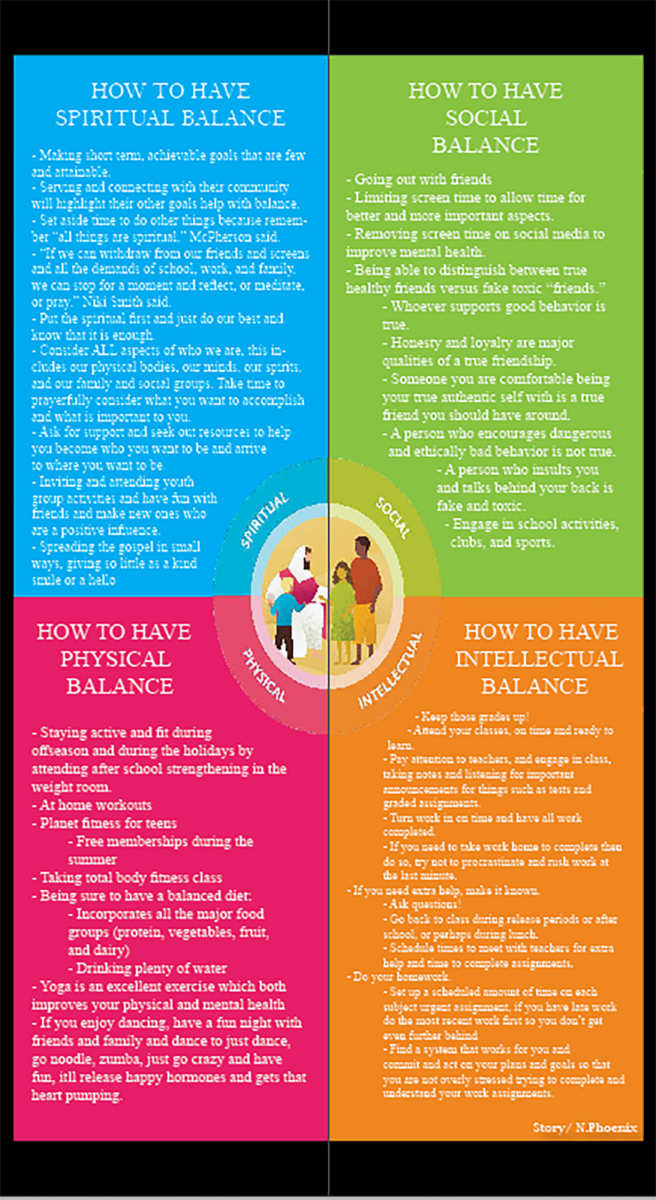The holidays are here, and it is easy for people to get distracted and completely forget about their normal routines. Youth stop working out consistently. They get sucked into things and start going out with friends or perhaps stay home and stay lazy, doing whatever they want. Forgetting to remain spiritually, physically, intellectually, and socially balanced. Forgetting what they need.
“The Church of Jesus Christ of Latter-day Saints encourages youth to set goals in three areas of focus: service and activities, personal development, and growing through gospel learning. The four areas to set goals in are: spiritual, social, physical, and intellectual. The youth are encouraged to develop new talents, interests, and skills and prepare for missionary service, education, work, and family.” (Quote from Prophet Russel M. Nelson)
It is important to maintain balance. A physical, spiritual, intellectual, and social balance. Being sure to keep yourselves healthy and therefore happy because our physical health can and does affect our mental, and vice versa.
“Being physically active is extremely important for young people as it leads to increased confidence, positive social interactions, and strong bodies and minds. By leading a physically active life while growing up, young people set themselves up for a successful and healthy adult life,” Physical Education Teacher and High School Girl’s Rugby Coach Mallory Hammitt said.
Mental Health has a hefty impact on one’s physical health and it is important to learn how to create good habits and coping skills earlier in life for a more prosperous future.
“Mental health can manifest with physical symptoms as well as the mental and emotional. Somebody depressed may sleep more or less, eat more or less, have chronic pain. Similarly physical ailments can affect us mentally – one thing in healthcare we screen for in people with chronic illness is signs of depression or anxiety. Who is happy when they don’t feel good? Who wants to engage with other people when they are depressed? How many social events will somebody with anxiety attend? We are one person, every piece impacts the person as a whole, like a puzzle. These things are important for everybody, but the things we learn in our youth become part of us…habits. Creating good habits and strong coping skills now will lead to a happier and more successful adulthood,” Balance Autism Director of Nursing Teresa Whiteaker R.N. said.
For those of you who belong to a church, you know that spiritual balance is also a very important aspect to consider in our daily lives, rather than just church Sunday. Those who do not, well… now you do. Having a spiritual balance in our lives provides a sense of peace and allows for an easier and hopefully less stressful environment for us to belong.
“Having a spiritual balance in a youth’s daily life is fundamental and crucial for them to succeed in the other areas of their lives,” Young Women First Counselor Sister Beverley McPherson said.
“It is so important for us to escape the craziness of life daily,” Young Women President Sister Niki Smith said.
“There is so much emphasis on phones and social media and networking that this can consume all of your time. I think it’s important to take a moment and reflect on where we are and where we want to be. As they [youth] take time to prayerfully consider what they want to accomplish and what is important to them, they can live more purposefully. They can ask for support and seek out resources to help them become who they want to be and arrive where they want to be,” Des Moines River Ward of the Des Moines Iowa Branch Bishop Jared Hintz.
In addition to physical and spiritual balance, there are two more important aspects to remember when thinking of goals for a healthier and happier life. Having an Intellectual and social balance.
All throughout your life you are going to learn new things and have new experiences, but to really use these skills and gifts is to have consistency. Meaning, to keep these skills up to date, you may have to practice in regularly spaced increments. Having a routine. So that you may remember these skills so that it becomes a sort of muscle memory and learn more advanced developments to those skills for the best, progressive life. In school and at work you learn and build skills necessary for living in this world. Skills such as communication, teamwork, or more school-oriented skills, like maths, maps/geography, social studies, sciences, and a whole bunch more. At central you learn more task/ work force skills, like culinary work, design, hospitality, veterinary, protective, law and justice, journalistic, and many more, which can be used in future and dream careers now and in the future.
“Okay, I think that regardless of being a student or an adult, it is very important to try to balance our work and social and emotional needs. What that balance is depends on that person’s goals at any given time.
Some simple tips for creating that balance might include making lists of what needs to get accomplished and then prioritizing those tasks. Something we try to help seniors with is having Senior Workshop time during the school day every week, so they have that dedicated time to working on their future plans. We hope that having this time/space to work on things and get help relieves some of the pressure that seniors feel when trying to make decisions and complete tasks. Which leads to another good tip for trying to balance all of the aspects of our lives and work—creating boundaries and getting comfortable in saying no if you need to. I do hope this helps you though!” East High school Counselor Ashlee Duimstra said.
Now that you understand the importance of balance in your lives take a moment to reflect.
“When we take a moment and reflect on where we are and where we want to be, we need to consider all aspects of who we are, this includes our physical bodies, our minds, our spirits, and our family and social groups. If we fail to focus on one of these aspects, we can have our lives going in directions that we didn’t anticipate or want,” Bishop Jared Hintz said.
Yes, it is important for youth to consider all aspects when striving to maintain a physical, spiritual, intellectual and social balance in their everyday lives, but it is just as important to remember not to overcompensate for forgotten or neglected areas.
“Too much of anything can be detrimental to your wellbeing- physical, mental, emotional, spiritual. Every aspect of us is dependent upon the others. For youth, learning the skills to prioritize what is important and recognize when and if something is having a negative impact on you (mentally, physically, emotionally, spiritually) and removing it. Many adults struggle to learn this same thing and we keep things that are hurting us in our lives. Every choice we make has consequences for us and those close to us, some we can see, others we cannot. Creating good habits and strong coping skills now will lead to a happier and more successful adulthood,” Balance Autism Director of Nursing Teresa Whiteaker R.N. said.




